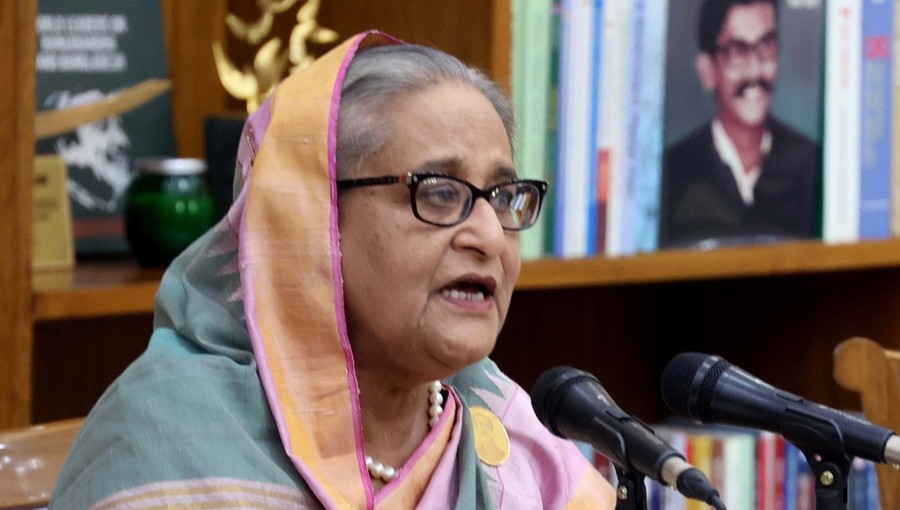
Photo: PMO
Prime Minister Sheikh Hasina speaks at a press conference in Ganabhaban, Dhaka, discussing the outcomes of her recent state visit to India. (June 25, 2024)
Dhaka, June 25, 2024 — Bangladesh Prime Minister Sheikh Hasina held a press conference at her official Ganabhaban residence today, addressing the outcomes of her two-day state visit to India from June 21-22, 2024, at the invitation of Indian Prime Minister Shri Narendra Modi. This marked her first bilateral visit since the formation of her new government in January 2024 and the first by any Head of State or Government to India following its 18th Lok Sabha elections.
Teesta Master Plan Project: Evaluating Proposals from China and India
Prime Minister Hasina revealed that her government is carefully evaluating proposals from both China and India for the implementation of the Teesta master plan project. Emphasizing the importance of national interest, she stated, "We must accept the proposal which will be more beneficial for the people of our country." China has completed a physical survey, while India is keen to conduct another. The final decision will consider the project's applicability, return on investment for public welfare, and the country's ability to repay the loan.
State Visit Highlights
During her visit, Prime Minister Hasina received a warm welcome at Delhi Palam Airport, followed by a cultural reception. On June 21, she met with India's External Affairs Minister Dr. S. Jaishankar and an Indian business delegation to discuss bilateral trade expansion. The following day, she was accorded a formal state reception by Prime Minister Modi at Rashtrapati Bhavan, where she was given a guard of honor and paid tribute to Mahatma Gandhi at Rajghat.
Bilateral Discussions and Agreements
A significant bilateral meeting was held at Hyderabad House, where discussions spanned politics, security, border management, trade, connectivity, water sharing, energy, and regional cooperation. Prime Minister Modi emphasized the flourishing relations between Bangladesh and India, highlighting their commitment to regional cooperation amid global instability.
Memorandums of Understanding (MoUs) and Vision Statements: Five new MoUs were signed, focusing on rail connectivity, maritime cooperation, green economy, information technology, and military education. Additionally, three MoUs were renewed in health, disaster management, and fisheries. Two Vision Statements on 'Digital Partnership' and 'Green Partnership for Sustainable Future' were also adopted.
Joint Programs: Thirteen joint programs were announced, including the renewal of the Ganges River Water Sharing Agreement and India's assistance in the Teesta River Water Management and Water Conservation Project. Other initiatives include the introduction of e-Visas for Bangladeshi patients, new transportation services, regional power cooperation, and the implementation of 'Rupee' and 'Taka-Pay' cards to facilitate cross-border payments.
Engagement with Indian Leadership
Prime Minister Hasina also had several key meetings, including a courtesy call on Indian President Smt. Droupadi Murmu and Vice-President Shri Jagdeep Dhankhar, where they lauded Bangladesh's socio-economic development and stability.
Strengthening Bilateral Relations
Prime Minister Hasina's visit is expected to play a pivotal role in further enhancing the already robust Bangladesh-India relations. She noted that the visit, although brief, was highly fruitful, focusing on setting a future course for collaborative progress under 'Smart Bangladesh' Vision 2041 and 'Viksit Bharat 2047'.
The state visit underscored the cooperative spirit between Bangladesh and India, promising a prosperous future for both nations through strategic collaboration and mutual support. Prime Minister Hasina's engagements and agreements during this visit are poised to bring long-term benefits to the people of both countries, solidifying their partnership in the region.
End//V7N//AJ//DK

Comment: